No products in the cart.
We deliver to:
🇦🇺 Australia
🇨🇦 Canada
🇨🇿 Czechia
🇩🇰 Denmark🇪🇪 Estonia
🇮🇪 Ireland
🇮🇱 Israel
🇮🇹 Italy
🇯🇵 Japan
🇲🇽 Mexico
🇵🇱 Poland
🇰🇷 South Korea
🇨🇭 Switzerland
🇬🇧 United Kingdom
🇺🇸 United States of Americaand more
We deliver to:
🇦🇺 Australia
🇨🇦 Canada
🇨🇿 Czechia
🇩🇰 Denmark🇪🇪 Estonia
🇮🇪 Ireland
🇮🇱 Israel
🇮🇹 Italy
🇯🇵 Japan
🇲🇽 Mexico
🇵🇱 Poland
🇰🇷 South Korea
🇨🇭 Switzerland
🇬🇧 United Kingdom
🇺🇸 United States of Americaand more
Cardio arginine Zdorovya syrup bottle 100 ml
$23.93
Free Worldwide Shipping
to: Australia, Canada, Czechia, Denmark, Estonia, Ireland, Israel, Italy, Japan, Mexico, Poland, South Korea, Switzerland, United Kingdom, United States and more
In stock
Cardio Arginine refers to agents that affect the cardiovascular system, various combined cardiological drugs.
Categories: Heart and blood vessels
Brand: Zdorovye
Payment
PayPal, Debit or Credit card, Google Pay, Apple Pay
Pharmacological properties
Cardio- and endothelium-protective metabolic agent with antihypertensive and adaptogenic properties. The drug reduces myocardial ischemia, improves coronary blood flow, normalizes the functional state of the endothelium of coronary and peripheral vessels, has antihypoxic, membrane-stabilizing, antioxidant and antiradical properties. In case of hypertension, it helps to normalize blood pressure and reduces total peripheral vascular resistance. The antihypertensive effect of the drug is realized due to the property of arginine (as a nitric oxide donor) to enhance endothelium-dependent vasodilation, as well as the ability of this amino acid to regulate blood pressure and maintain the osmolality of the body’s fluid environments and blood volume, participating in the synthesis of the peptidergic hormone arginine vasopressin. The metabolic cardioprotective effect of the drug is due to the ability of arginine, asparaginate and succinate to activate the processes of energy supply of the heart muscle, restore the energy potential in cells, normalize acid-base balance and intermediate metabolism, as well as protein metabolism in the myocardium, stimulate the synthesis of amino acids, aminosugars and nucleotides. Asparaginate is an intracellular carrier of K + and Mg2 + ions. Thanks to potassium and magnesium Asparaginate, electrolyte imbalance in the body is eliminated, coronary blood circulation improves. Mg2 + ions activate Na + / K + -ATPase, due to which the intracellular concentration of Na + ions decreases and the flow of K + ions into the cell increases. When the concentration of Na + ions inside the cell decreases, the exchange of Na + ions for Ca 2+ ions in the smooth muscles of the vessels is inhibited, which leads to their relaxation. K+ ions stimulate the synthesis of ATP, glycogen, proteins, and acetylcholine.
The drug exhibits an adaptogenic-actoprotective effect due to substrate induction of cellular metabolism. Arginine, asparaginate and succinate activate the enzymatic processes of the Krebs cycle, stimulate the excretion of fatty acids and glucose by cells during physical exertion, have a positive effect on aerobic processes of cell energy supply, and reduce lactic acidosis.
Indication
In the complex therapy of chronic heart failure, coronary artery disease (stable angina caused by vascular dysfunction or spasm, painless myocardial ischemia), angina pectoris, atherosclerosis of the heart and brain vessels, diabetic angiopathy, hypercholesterolemia, early rehabilitation period after myocardial infarction and other somatic diseases, with obliterating endarteritis, heart rhythm disorders caused by potassium and magnesium deficiency in the body (mainly with ventricular arrhythmias), including during treatment with cardiac glycosides.
Application
syrup
It is used internally by adults.
For diseases of the cardiovascular system and during rehabilitation: 1-2 doses of syrup (7.5 ml) per day. The course of treatment is 10-20 days.
The maximum daily dose is 15 ml.
Possible use in patients with diabetes.
The package contains a measuring cup.
Solution for injection
The drug is prescribed to adults intravenously by drip or jet.
Intravenously drip 1-2 times a day, 5 ml per 100-200 ml of 5% glucose solution or 0.9% sodium chloride solution at a rate of 20-30 drops per minute.
Intravenous injection is administered slowly (at a rate of no more than 5 ml/min) in a dose of 5 ml 1-2 times a day.
The course of treatment is 5-10 days. The maximum daily dose is 10 ml.
After completion of the intravenous administration of the drug, if necessary, you should switch to oral administration of the drug in another dosage form – Cardio arginine Zdorovya syrup.
Contraindication
Hypersensitivity to the components of the drug, hyperkalemia, AV block I-II degree.
Side effects
On the part of the gastrointestinal tract: rarely – a feeling of mild discomfort in the stomach and intestines, nausea, vomiting, diarrhea, stomach pain, ulceration and gastrointestinal bleeding, flatulence, dyspeptic phenomena, thirst immediately after using the drug, which disappear on their own;
from the cardiovascular system: decreased blood pressure, impaired intraventricular conduction;
from the nervous system: muscle weakness, hyporeflexia, disorientation, dizziness, paresthesia, feeling of heat, facial flushing, respiratory depression, convulsions, increased sweating;
Skin: possible allergic reactions (itching);
others: myasthenia, asthenia, phlebitis, venous thrombosis, dyspnea.
With rapid intravenous administration – hyperkalemia, hypermagnesemia, muscle hypotension, paresthesia of the extremities, slowing of AV conduction, arrhythmia, cardiac arrest.
Special instructions
Use during pregnancy and breastfeeding. The safety of the drug during pregnancy and breastfeeding has not been established.
Breastfeeding should be discontinued during treatment with the drug.
Children: The efficacy and safety of the drug in children have not been established.
The ability to influence the reaction speed when driving vehicles or working with other mechanisms. Does not affect.
Interactions
When using arginine aspartate, it is necessary to take into account that the joint use of aminophylline with arginine may be accompanied by an increase in the content of insulin in the blood; spironolactone with arginine – an increase in the level of potassium in the blood.
The drug improves the tolerance of cardiac glycosides, enhances the effect of drugs that stimulate trophic processes in the myocardium; prevents the development of hypokalemia caused by the use of saluretics, corticosteroids, cardiac glycosides. With simultaneous use with potassium-sparing diuretics and ACE inhibitors, the risk of developing hyperkalemia increases (the level of potassium in the blood plasma should be monitored). The drug reduces sensitivity to cardiac glycosides.
Overdose
Symptoms: hypotension; hyperkalemia and hypermagnesemia: stomach pain, metallic taste in the mouth, muscle weakness, paresthesias, muscle stiffness, ECG shows increased T wave amplitude, decreased P wave amplitude, and QRS complex expansion.
Treatment: symptomatic therapy aimed at supporting vital functions, parenteral administration of calcium preparations.
Storage conditions
Store in original packaging at a temperature not exceeding 25 °C.
Be the first to review “Cardio arginine Zdorovya syrup bottle 100 ml” Cancel reply
You may also like


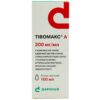

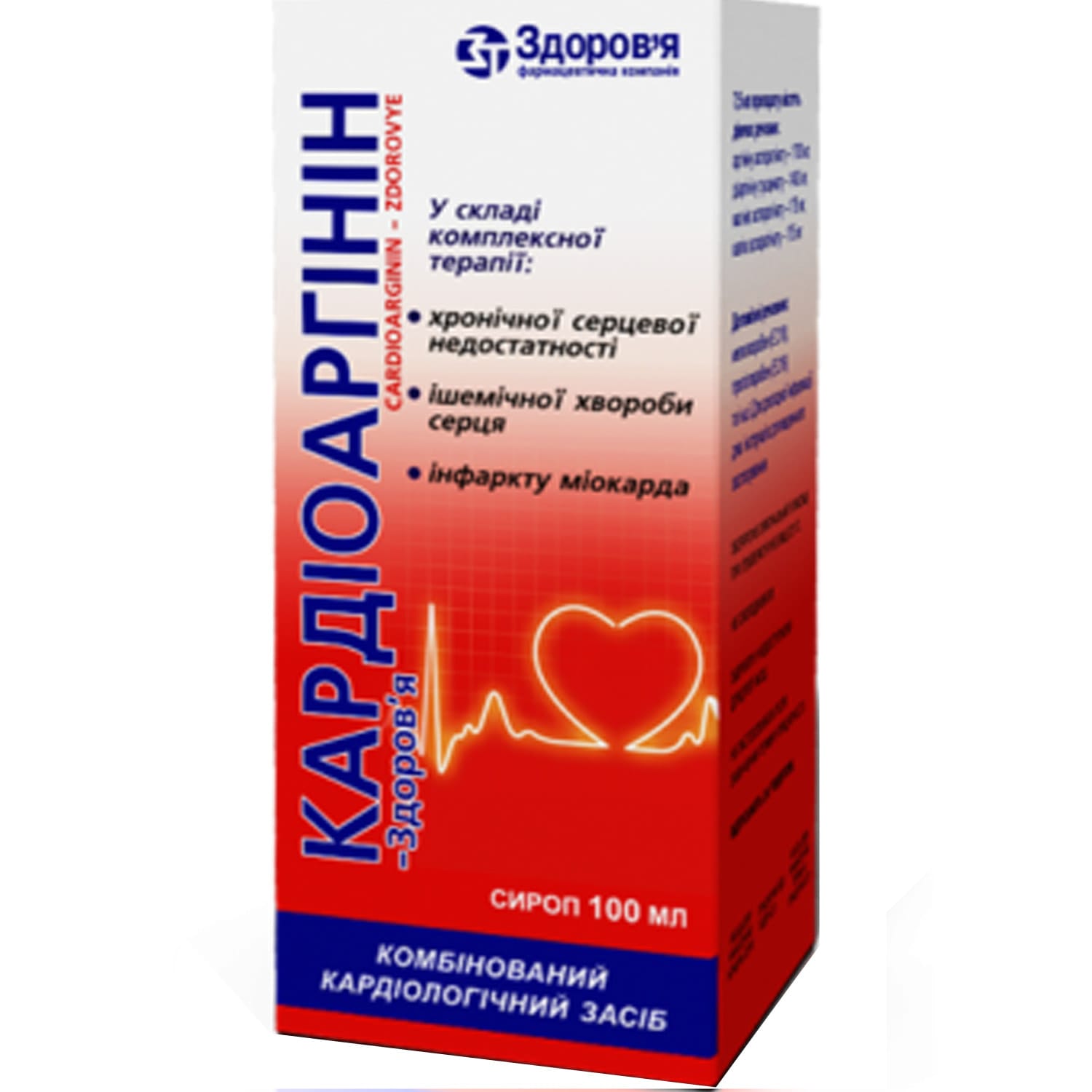

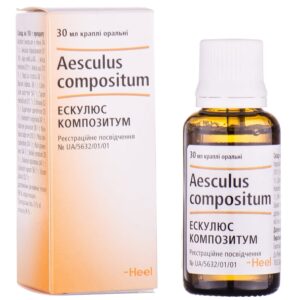
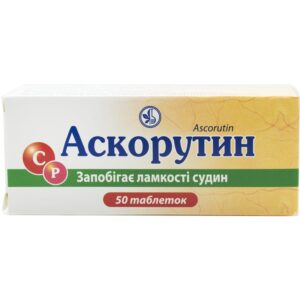

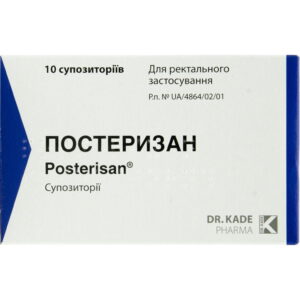
Reviews
There are no reviews yet.